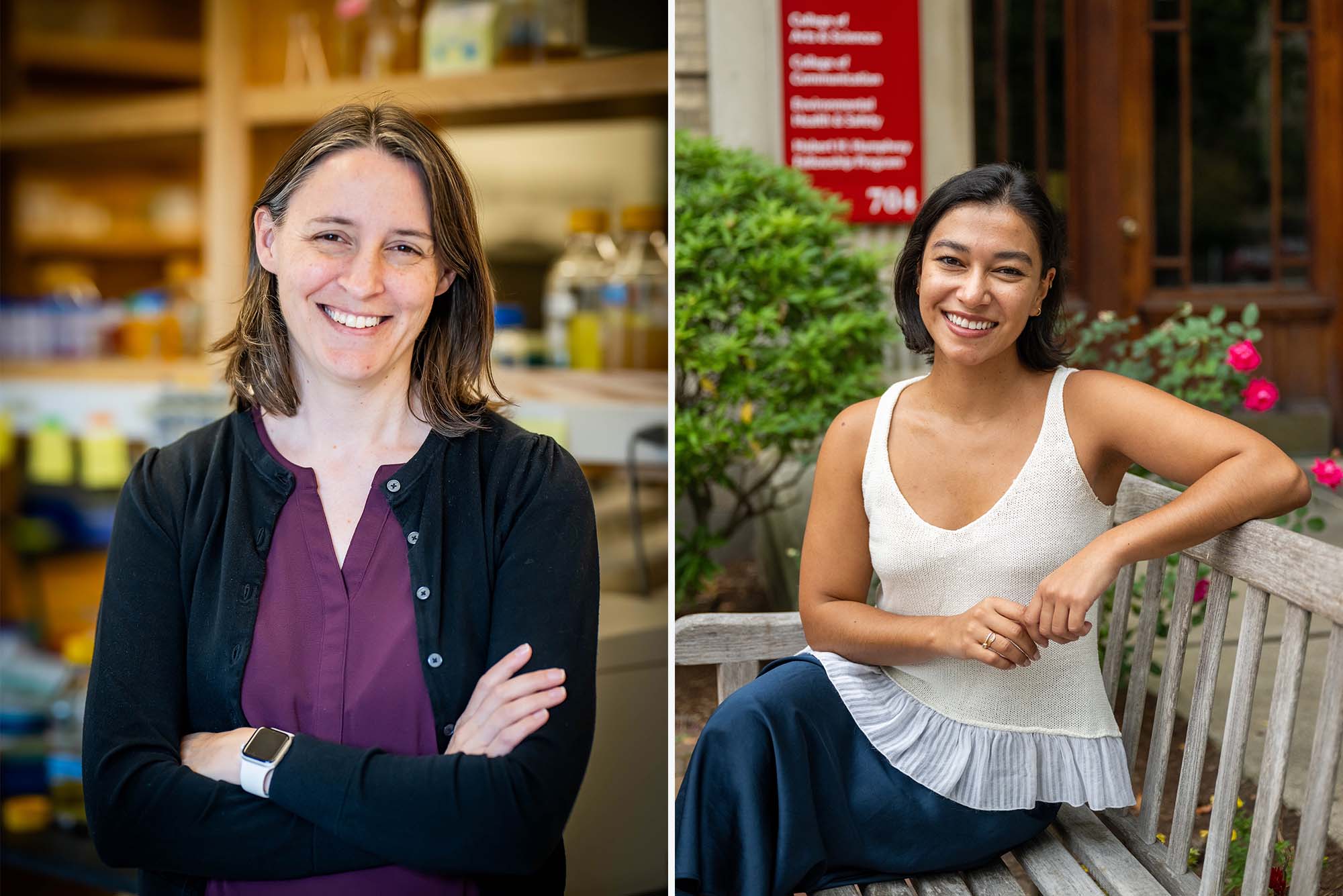New BU Postdoctoral Awards Celebrate Excellence in Mentorship and Research
Inaugural honors “reflect the critical contributions of our postdocs and their mentors”

Mary Dunlop (left), an ENG associate professor of biomedical engineering, won the Award for Excellence in Mentoring Postdocs, and Tatiana Padilla, a postdoctoral fellow in the BU Center for Innovation in Social Science, won the Outstanding Postdoc Award.
New BU Postdoctoral Awards Celebrate Excellence in Mentorship and Research
Inaugural honors “reflect the critical contributions of our postdocs and their mentors”
When postdoctoral researcher Jean-Baptiste Lugagne began applying to faculty positions last year, he steeled himself for a daunting process. In an intensely competitive job market, university search committees are seeking candidates who can demonstrate a vast array of skill sets beyond their field-specific expertise, from teaching to grant writing to lab management.
But Lugagne had a secret weapon to help him through the job search: his faculty mentor, Mary Dunlop. A Boston University College of Engineering associate professor of biomedical engineering, Dunlop guided Lugagne in refining his research proposal, gave him feedback on his interview materials, and even helped him organize a practice “chalk talk” with other faculty to ensure he was prepared for his presentations to search committees. The preparation paid off: Lugagne is joining the University of Oxford as an assistant professor of engineering science next year.
Now, in recognition of her deep commitment to the professional and personal development of postdoctoral researchers at BU, Dunlop has been awarded the University’s first-ever Award for Excellence in Mentoring Postdocs. She was honored at BU’s National Postdoc Appreciation celebration. Also recognized at the event was postdoctoral fellow Tatiana Padilla of the BU Center for Innovation in Social Science, winner of the inaugural Outstanding Postdoc Award. Both honors were presented by BU Professional Development & Postdoctoral Affairs, which provides programs, resources, and services to BU doctoral students, postdoctoral scholars, and their faculty mentors.
“These awards reflect the critical contributions of our postdocs and their mentors,” says Pallavi Eswara, director of postdoctoral affairs at BU. “Our postdocs are doing excellent research, but they are also contributing to our research community in countless other ways, as teachers, mentors, DEI leaders, and innovators.”
Engineering Cells, Structuring Support
Researchers in Dunlop’s lab—which uses approaches from synthetic and systems biology to better understand and engineer cellular processes—say it’s known for its dynamic and collaborative environment. Balancing her roles as a researcher, educator, and mentor, Dunlop integrates mentoring into her regular schedule with weekly one-on-one and group meetings. She says this structured approach ensures her team members have consistent opportunities to seek advice and share progress.
When asked what it takes to be an effective mentor, Dunlop emphasizes the importance of fostering independence and being a supportive sounding board. “Postdocs bring a wealth of experience to the table,” she says. “My role is to provide them with the freedom to explore their ideas while also offering support for everyday challenges, from breaking down paper writing into manageable tasks to cheering them on during tough times.”
Postdocs bring a wealth of experience to the table. My role is to provide them with the freedom to explore their ideas while also offering support for everyday challenges, from breaking down paper writing into manageable tasks to cheering them on during tough times.
Despite her comprehensive support, Dunlop recognizes the unique challenges faced by postdocs, such as balancing their personal and professional lives and navigating career uncertainties. She offers a listening ear and tries to accommodate their individual circumstances, acknowledging the complexities that come with this phase of their careers.
“Mary genuinely cares about the well-being of her postdocs and will go above and beyond to see us succeed,” says Razan Alnahhas, one of four postdoctoral researchers who came together to nominate Dunlop for the award. “In the lab, we always say, ‘In Mary we trust,’ because we know we can rely on her for support, encouragement, and guidance.”
An Inspiration for Undergraduates
At the BU Center for Innovation in Social Science (CISS), policy analyst and outstanding postdoc awardee Padilla studies the effects of immigration policy and enforcement on local communities. She was nominated by Deborah Carr, the center’s director, who says Padilla “exemplifies the spirit of the award.”
“Tatiana is doing remarkable teaching and mentoring, working with a team of undergraduate students in their very first hands-on research experience, and they are inspired and invigorated by the process,” says Carr, a College of Arts & Sciences Distinguished Professor of sociology.
Tatiana is doing remarkable teaching and mentoring, working with a team of undergraduate students in their very first hands-on research experience, and they are inspired and invigorated by the process.
Using data science tools to collect publicly available reports of immigration raids, Padilla has worked with 25 undergraduate researchers in the past year to identify and analyze more than 700 raids that occurred between 2014 and 2018. The goal of the project, which was born from a chapter of Padilla’s PhD dissertation at Cornell University, is to document the frequency and geographical distribution of immigration raids, as well as the demographics of those affected—and ultimately contribute to a more nuanced understanding of immigration enforcement experiences in the US.
“I am deeply grateful for this award,” says Padilla. “Academia prepares you well for rejection. It’s very rare and so sweet when you get a tangible recognition of what you’re doing.”

Comments & Discussion
Boston University moderates comments to facilitate an informed, substantive, civil conversation. Abusive, profane, self-promotional, misleading, incoherent or off-topic comments will be rejected. Moderators are staffed during regular business hours (EST) and can only accept comments written in English. Statistics or facts must include a citation or a link to the citation.